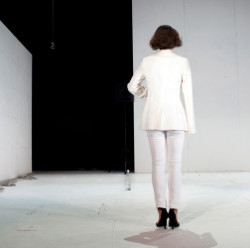Secret Theatre: Show 2 (Lyric Hammersmith)

Doing things differently, flying in the face of conformity, confusing the critics, challenging the public, making the best of a chaotic £16.5m theatre re-build: all of this, and more, lies behind Lyric artistic director Sean Holmes‘ new “Secret Theatre” venture – which turns out, in its first manifestation, to be an outrageous, deliberately non-atmospheric staging of A Streetcar Named Desire by Tennessee Williams.
Streetcar is Show 2 in a repertoire that will run through next May while the Lyric is a building site. The audience huddles in the stalls. The circles and boxes are covered in plastic sheeting, the actors dressed down in sportswear and T-shirts – the white vest is de rigeur for the appropriately Eastern European-sounding Stanley Kowalski of Sergo Vares – the New Orleans music a mash of jazz, blues and rap rhythms.
I haven’t yet seen the new Edward II at the National, but I like the idea of a classic play set in dashing contemporary relief, buffeted by the expectations of an audience and a critical aesthetic in the production. The drawl and tang and Deep South mistiness of Williams’ poetic dialogue is missing, but that’s the price you pay.
And the Blanche du Bois of disabled actor Nadia Albina (born without a right fore-arm, a stalwart of Graeae and a star of the Paralympics opening ceremony) is so different and unexpected – she’s far more girlish than raddled – you see the play in a different prism entirely. Her drinking is secondary to her physical neediness, not part of it, and her stripped-down-to-lingerie advance on Steven Webb‘s young collector is suddenly, alarmingly, sexy.
Holmes’ production maybe misses a trick here. Shouldn’t that scene be played right out, instead of being shrugged off? For the collector is the young husband Blanche lost to another man, then a suicide decision. “I don’t want realism, I want magic,” she famously declares, but you know that’s something she’s fooling herself over, too.
The stage is as bare and stark as possible, designer Hyem Shin providing three white wall-like slabs and three suspended neon light strips. The poker school sport red shirts and slice red water melons, and Leo Bill‘s dorky, dumb-ass Mitch, the guy who loves and nearly wins Blanche before she becomes impossible, peels off, most touchingly, while Adelle Leonce as Stella, Stanley’s wife and Blanche’s sister, bears the brunt of the domestic catastrophe.
You don’t get a sense of faded gentility, the lost estate at Belle Rive, or the melancholy poetry of the street cry (here a disembodied, perfunctory sound effect) of “flores para los muertos.” But you do get the violence, the suitcases, the broken dreams and the booze. It’s a flawed outline of Williams’ greatness, and a startling declaration of – is it radical, or plain wilful? – intent.










